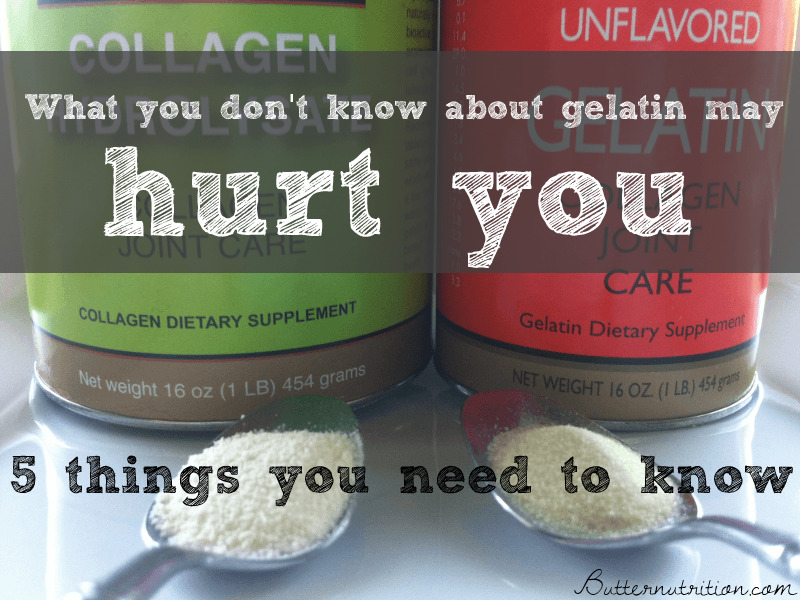
Gelatin and collagen are all the rage right now — and for GOOD reason, but there are some not-so-widely known facts that I would like to share with you. If you’ve ever overdosed on gummy bears, sweet and sour protein bites, or overdosed on collagen the first time you used it, you MAY already know what I’m about to talk about!
1) EATING TOO MUCH GELATIN OR COLLAGEN AND/OR USING THE WRONG KIND FOR YOU CAN CAUSE DIGESTIVE UPSET—> CONSTIPATION, PAIN, EXCESSIVE FULLNESS, BLOATING AND LACK OF APPETITE.
The primary amino acid in gelatin and collagen is glycine, and it is needed in abundance to fuel detoxification in the liver, particularly phase 2.
According to Peter Bennet in The 7 Day Detox Miracle Solution, “Glycine is a non-essential amino acid that the body uses for detoxification reactions in the liver.”
Eating too much too quickly can overwhelm your body, and do more harm than good. Start with a small serving ½-1 tablespoon per day and slowly increase your dose every few weeks as tolerated. If you have a digestive condition like IBS or IBD, you may have to go even slower, or you may not tolerate it at all.
According to Dr. Ray Peat, PhD., gelatin or collagen can make up to about to 30% of total protein intake, so for the average person that is about 3-6 tablespoons per day (1 tablespoon is 6 grams of protein).
2) CHOOSE THE TYPE OF GELATIN THAT FITS YOUR DIGESTIVE ABILITIES.
This is what I’ve found works best with my clients:
- Strong digestion: regular gelatin (dissolved only in desserts, snacks, etc.), collagen hydrolysate, and bone broth
- Weak digestion: collagen hydrolysate, bone broth
- Very weak digestion: bone broth (however, if you have a digestive condition like SIBO, you may not be able to tolerate bone broth made from cartilage at all due to it being a high FODMAP food).
3) DISSOLVE IT.
Both gelatin and collagen hydrolysate should be properly dissolved in fluid. This is especially important for regular gelatin which is only hot water-soluble. Collagen on the other hand has gone through an additional stage of processing that renders it hot and cold soluble and it will not make a fluid gel.
4) EAT GELATIN OR COLLAGEN WITH CARBOHYDRATES AND FAT FOR THE BEST DIGESTION.
Since gelatin and collagen provide protein, it’s important to eat it with carbohydrates and fats in order to stimulate strong digestive juices and allow the body the fuel to use the protein properly.
5) REGULAR GELATIN AND COLLAGEN HYDROLYSATE ARE NOT INTERCHANGEABLE.
They have a different chemical structure and serve different purposes in the kitchen. I get a lot of questions about substituting one type for another in recipes, and it’s not a good idea. This is why:
-Regular gelatin (red can) is hot water-soluble, makes things gel, and is harder to digest. Only use this one in SMALL quantities like making a dessert or something that gels (gummies, etc).
-Collagen hydrolysate (green can) is cold water-soluble, does not make things gel, and easier to digest than the regular. This makes it a good choice for using it like a protein powder.
Using these tips can help you incorporate gelatin and collagen hydrolysate into your diet without experiencing constipation, bloating, and digestive problems.
6) GELATIN AND COLLAGEN INTAKE CAN CAUSE ANXIETY, INSOMNIA AND DECREASED MOOD IN SOME PEOPLE (TAKE HEED)
It’s been reported that regular gelatin and collagen intake can contribute to anxiety, insomnia and decreased mood in some people, and I suspect this has genetic connections to undermethylation.
Undermethylators tend to have a genetic predisposition towards low serotonin (happiness hormones) and low dopamine (pleasure hormone). As well, undermethylators tend to have a genetic methionine (amino acid) deficiency. Because collagen is low methionine, so it has the potential to displace higher methionine-containing proteins in the diet, deepening deficiency. For example, collagen contains about .7% methionine vs. chicken and beef are closer to 5%, and dairy is around 4%.
This is typically something that would not happen right away, but could drive a undermethylator’s methionine deficiency over time (years).
On the flipside, overmethylators do not need more methionine in their diet, and may find a greater benefit from glycine-rich collagen protein.
Another thing to look out for is depression and anxiety that could hypothetically result from not eating enough animal protein to balance the amino acid profile of collagen, depleting tryptophan (the precursor to serotonin).
ONE LAST IMPORTANT THOUGHT
Don’t ever forget to pay attention and respond to your own reactions to collagen and gelatin. If you’re trying to incorporate them into your diet and you are getting side effects (digestive or otherwise), you are either doing too much too quick or it is not working for you!
There are some health conditions where collagen is not a good fit (and could aggravate your symptoms), so don’t try to force something on your body it is otherwise rejecting.
Always listen to your body and get data when needed to steer you in the right direction.
WANT MORE DIGESTIVE TIPS TO SUPPORT GUT HEALTH?
If your body has a lot of nutritional debt (see quiz below) chances are you may not tolerate gelatin or collagen well or maybe even at all until you strengthen your digestion.